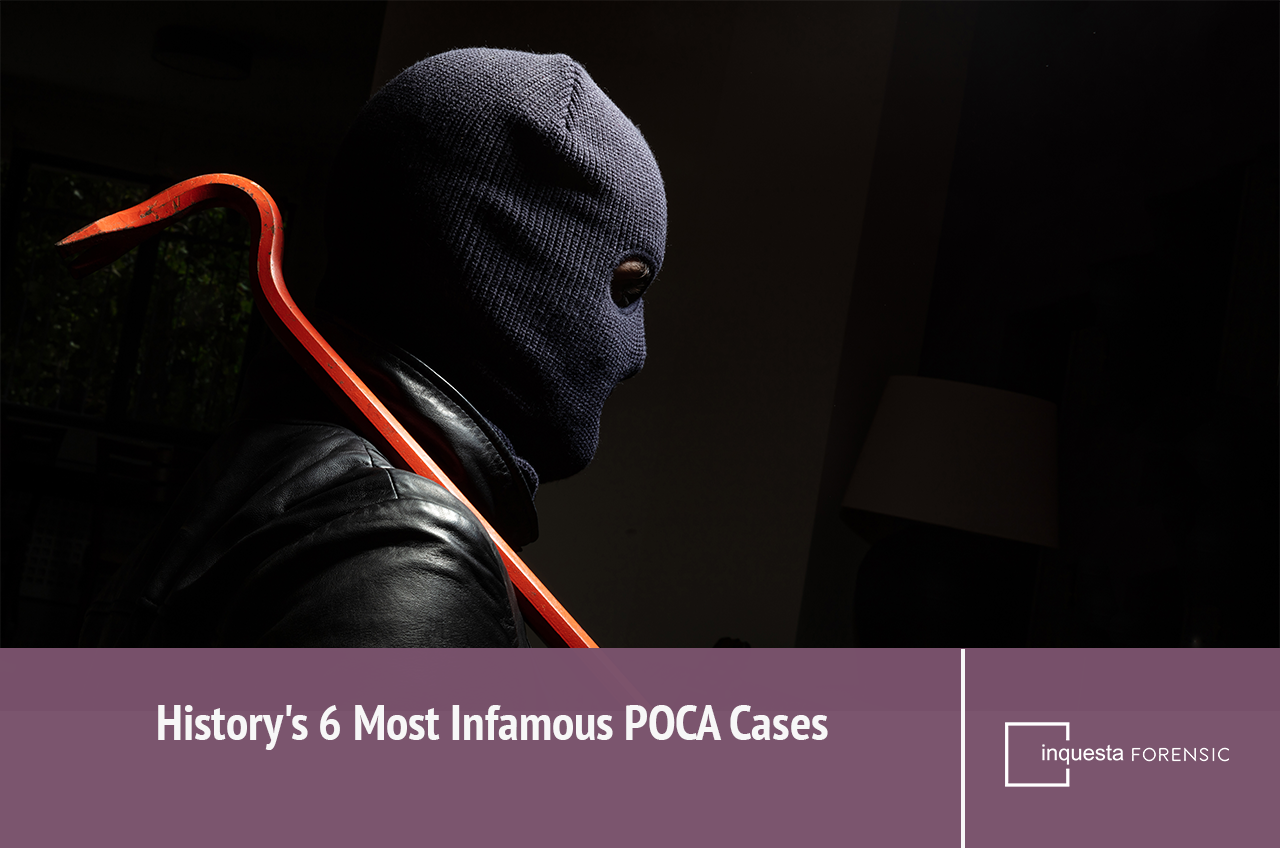History is full of tales of infamous individuals, elaborate criminal enterprises, and famous POCA cases that have left an indelible mark on the landscape of financial crime. From the daring escapades of The Hatton Garden Heist, to the huge sums involved in Bernie Madoff’s Ponzi Scheme, and even the notorious criminal activities of Pablo Escobar, these cases not only exemplify the enduring relevance of POCA legislation when it comes to combating financial crime, but the importance a forensic accountant can play in bringing justice to criminals who think themselves outside of the law.
Illegal gains are very rarely readily available to law enforcement agencies. When funds are cleverly concealed in this manner, forensic accountancy has historically emerged as a crucial tool to unravel and combat Proceeds of Crime Act cases.
In this blog, we delve into six of history’s most infamous POCA cases, each with their own stories of crime, punishment, and the ultimate pursuit of justice.
Basics of Proceeds of Crime Act Cases
Forensic accountancy plays a vital role in unravelling often complex POCA cases. Understanding the core principles that guide POCA cases, from legislation and investigation, to confiscation orders and asset recovery, is vital to navigating the intricate web of financial crime and misconduct.
A selection of the primary principle of proceeds of crime act cases include:
- Legislation: The proceeds of crime act is a legislation intended to target the illicit gains from criminal behaviour and activity. The purpose is to provide authorities with the ability to legally seize and confiscate any assets gained via criminal means.
- Financial Crime: Crimes that can come under the POCA include money laundering, fraud and financial crimes, cryptocurrency fraud, and much more.
- Confiscation Orders: One of the primary benefits of POCA is the issuing of confiscation orders. These orders are what allow authorities to confiscate the assets believed to be obtained thanks to criminal activity.
- Investigations: POCA will typically involve a complex financial investigation. This is often done to uncover and trace the flow of illicit funds.
- International Consideration: Financial crimes are not bound by borders. As a result, they will often need cooperation between law-enforcement agencies and financial institutions.
- Potential Penalties: Penalties for offences under POCA can vary from fines and asset-confiscation to imprisonment. The severity of the punishment will depend on the jurisdiction and the nature of the offence.
For more information on the confiscation process, how hidden assets are found, or any other aspect of POCA cases, view our selection of dedicated blogs.
The 6 Most Famous POCA Cases: 100 Years of Crime and Punishment
From The Panama Papers Incident to the LIBOR scandal of 2012, and even the notorious criminal ‘career’ of Al Capone, throughout history there have been a number of famous (and infamous) POCA cases and cases that can be traced back to measures and aspects that are prevalent in the Proceeds of Crime Act.
When you’re thinking of what the most famous POCA cases are in history, the following are some of the most obvious and prominent that can be tied to the act or its framework:
The Panama Papers (2016)
The Panama Papers incident was a leak of 11.5 million documents in April 2016. These confidential documents were leaked to the German newspaper Süddeutsche Zeitung revealing detailed information about over 214,000 offshore companies, exposing their use of offshore finances and tax havens in order to evade tax, launder money, and commit a number of other financial crimes.
The release of the Panama Papers implicated a number of prominent politicians, business leaders, celebrities, and public figures from around the planet. This includes former members of parliament in the UK, heads of state and even royalty from around the planet, major names in the world of sport (most notably football), television, and cinema including people like Jackie Chan, Simon Cowell, Tiger Woods, and Lionel Messi.
Forensic accountants, backed by the Proceeds of Crime Act (POCA), played a crucial role when it came to tracking down and confiscating any assets linked to the illicit financial activities highlighted in the papers.
The legislation facilitated the recovery of proceeds derived from the crimes of these powerful people and is an excellent example of the international relevance POCA has in combating cross-border financial crimes. 
The Hatton Garden Heist (2015)
The Hatton Garden Heist was an extremely high profile burglary that took place in London throughout the Easter weekend of 2015. The target of the heist was the Hatton Garden Safe Deposit Company in London’s famed jewellery district.
The heist was national news in the aftermath, both for its audacity, the extent stolen, and the advanced age of a number of the perpetrators — the oldest being 80 years old at the time the crime was committed. The story of the Hatton Garden Heist was adapted into films in both 2017 and 2018.
The Hatton Garden Heist is one of the most famous POCA cases because, in the aftermath of the arrests, POCA measures were utilised in order to trace and confiscate all of the proceeds of the crime.
The legislation was used in order to prevent the criminals involved from being able to enjoy the benefits of the heist, and ensure that the ill-gotten gains could be recovered and returned to their rightful owners.
This particular case shows the vital role the Proceeds of Crime Act can have in tracing the seemingly impossible to find assets ‘gained’ from carefully organised unlawful activities.
London Interbank Offered Rate (LIBOR) Scandal (2012)
The Libor scandal of 2012 involved the widespread manipulation of ‘benchmark interest rates’. Benchmark interest rates are used to set the standard rates against which the interest rates of loans, mortgages, etc. are determined. These rates are based on the average interest rates at which banks lend to each other.
The scandal boils down to several organisations submitting inaccurate or misleading interest rate amounts, impacting the overall LIBOR calculations. This rigging of the interest rates in order to increase profits impacted the global financial markets.
Forensic accountants, thanks to the powers afforded to them via POCA, were able to uncover this fraudulent activity and seize the assets gained through this manipulation of the market.
The LIBOR case is an excellent example of how POCA legislation is in place to hold individuals accountable for the part they played in financial crime.
Bernie Madoff and His Ponzi Scheme (2008)
In 2008, Bernie Madoff, former chairman of NASDAQ and, at the time, a highly respected name and figure in the world of finance, committed one of the most egregious and infamous financial fraud schemes in modern history. The massive Ponzi scheme headed by Madoff defrauded investors of, in the end, billions of dollars.
The money invested in the scheme was supposed to be invested, with promises of excellent returns. However, instead of investing the funds, he used the money brought in from new investors to pay returns to existing investors. This fraud created the illusion of a successful investment strategy.
The scheme only came to an end thanks to the financial crisis of 2008. The huge hit on the market led some investors to attempt to withdraw their funds. When unable to return the money, and facing increasing financial difficulties, Madoff was forced to admit his wrongdoing and was arrested.
Forensic accountants working on the case were able to utilise powers that could be compared to those held within the Proceeds of Crime Act (POCA is UK legislation.) to trace and seize all of the assets Madoff had obtained by defrauding thousands of investors. These assets were then distributed to the victims.
Pablo Escobar (1993)
Notorious Colombian drug kingpin Pablo Escobar, leader of the infamous Medellín Cartel, generated enormous profits through drug trafficking, money laundering, and a variety of other illegal activities. While Escobar’s crimes, and his death in 1993, all occurred prior to the introduction of the Proceeds of Crime Act in 2002, so the actual legislation cannot be linked to the seizure of his assets, various principles of the act are reflected in the case.
After Escobar’s death in 1993, Colombian and U.S authorities worked together, using a variety of different pre-POCA legal mechanisms to trace and seize as much of his property, assets, and funds.
Aspects of the Pablo Escobar case that would come under POCA today include:
- International Cooperation between Columbia and the United States of America
- Extradition and asset confiscation across borders
- Pursue asset recovery and forfeiture
- Civil forfeiture
Al Capone (1929)
One of the most famous examples of a forensic accounting case in history, similar to Pablo Escobar, Al Capone’s crimes predated the introduction of POCA. Despite this, the case against Al Capone is a perfect exemplification of the benefits financial investigations and legal actions that would later go on to help form the specifics of the POCA.
Although Capone was most prominently associated with committing crimes such as bootlegging, racketeering, illegal gambling, corruption, and murder, he was ultimately convicted of tax evasion. This is because the government at the time was not able to directly link Capone to any of the more serious crimes he was known to have committed. Instead, more intelligent solutions were needed.
In order to get a conviction against Al Capone, authorities instead focussed on his financial activities and unpaid taxes. They utilised a number of laws very similar to POCA legislation today in order to trace, freeze and confiscate any assets that could be associated with Capone’s criminal enterprise.
Do You Need Help With a POCA Case? Contact Us Today
Upon reflecting on the various interesting and unique narratives that come with history’s most famous POCA cases, one truth emerges: the expertise of forensic accountants can make all the difference when you need to trace and size the proceeds of financial crime.
Inquesta Forensic, a leading name in forensic accountancy, has the experience necessary to unravel complex financial schemes and navigate the various intricacies of POCA cases. With a proven track record on a variety of proceeds of crime cases, our team of experts are perfectly placed to help.
When faced with the types of challenges that occurred in the famous POCA cases highlighted above, Inquesta Forensic’s seasoned accountants are equipped with everything needed to trace assets, conduct thorough financial investigations, and ensure that any ill-gotten gains can be recovered.
Our consistent commitment to excellence, combined with a deep understanding of the ever-evolving landscape of financial crime positions us as an ideal partner for anybody seeking justice.
Choose Inquesta Forensic and let our experts guide you towards a positive outcome. Contact us today to find out more about what we can do for you.
This article was originally posted at Inquestaforensic.co.uk
[/fusion_text][/fusion_builder_column][/fusion_builder_row][/fusion_builder_container]





